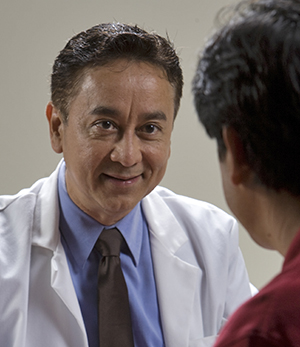Getting a Second Opinion on Cancer Treatment
It can be hard to decide which cancer treatment plan is best for you. You may want to get a second opinion. This means having another doctor look at your diagnosis and choices for treatment.

Why get a second opinion?
It's vital that you trust your doctor. You also need to feel good about your treatment choices. A second opinion can help you make your decision. And you can feel good about it, too.
When doctors plan cancer treatments, they consider:
-
The type and stage of the cancer.
-
How likely it is that the cancer can be cured.
-
How the treatment will affect your daily life.
-
Your overall health.
-
Your personal choices.
A second doctor can look at all of these things. They can help you be sure of your decisions. A second opinion can:
-
Confirm your diagnosis.
-
Allow you to see a specialist who treats the kind of cancer you have.
-
Confirm treatment advice. Or they can offer different choices.
-
Offer clinical trials that are available at a different treatment center.
-
Help you find a doctor or treatment center you like.
-
Help you feel sure that the plan you're thinking about is the best for you.
Is it hard to get a second opinion?
Many health insurers will pay for a second opinion. Ask your insurance what they will cover. A short delay in treatment won't make a difference in many cases. Talk with your doctor if you are worried about delaying treatment.
Don't worry about hurting your doctor's feelings by asking for a second opinion. This is often done when it comes to cancer care. And your doctor might be able to advise another expert for you to see.
How to get a second opinion
You have a number of ways to find a doctor who can give a second opinion. These include:
-
Your primary care provider. Your provider may be able to refer you to a specialist. This may be a surgeon. Or it may be a medical or radiation oncologist. These doctors often work together at cancer centers and hospitals.
-
Your cancer specialist. They may be able to refer you to another specialist.
-
NCI (cancer information service). This is a service of the National Cancer Institute. They can help you find cancer treatment centers near you. You can contact them at 800-4-CANCER (800-422-6237) or at their website.
-
Commission on Cancer. This is a program from the American College of Surgeons. They approve medical centers and hospitals that provide the best cancer care. You can search for an approved medical center .
-
American Medical Association (AMA). This group has an online Find a Doctor service. The AMA also has a directory of the medical groups in each state. This can help you find doctors in your state.
Other good choices for a second opinion include:
-
Your health insurance.
-
A local hospital or medical school.
-
A local cancer advocacy group.
-
Other people who have had cancer.
-
Friends and family.
Talk with your doctor to find local resources like these.
It's important that the doctor who gives you a second opinion has all the information they need about your health history and the treatment done so far. Ask what information they will need ahead of time. You may need to ask for records from your current facility. Key information includes a medicine list, a summary of any treatments you've had so far, and records from hospital stays. Get results from blood work, imaging tests, and any biopsies. Also ask for pathology reports.
Getting a second opinion can take time and effort. Most people find that it's worth it. It helps you have peace of mind about the next steps in your cancer care.
Online Medical Reviewer:
Jessica Gotwals RN BSN MPH
Online Medical Reviewer:
Susan K. Dempsey-Walls RN
Date Last Reviewed:
4/1/2025
© 2025 The StayWell Company, LLC. All rights reserved. This information is not intended as a substitute for professional medical care. Always follow your healthcare provider's instructions.